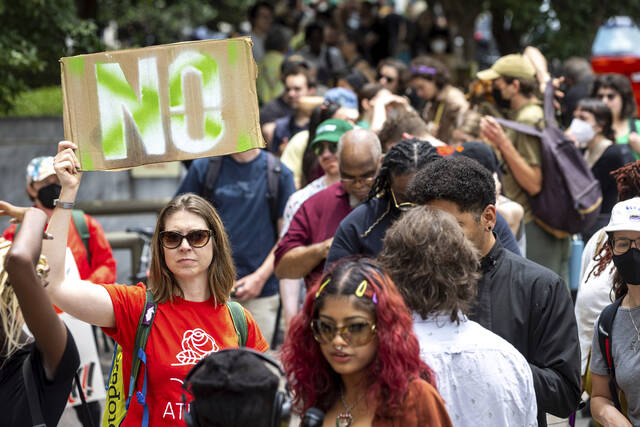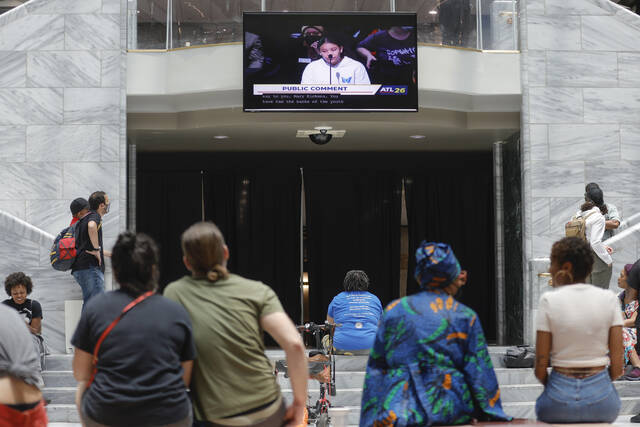Atlanta project decried as 'Cop City’ gets funding approval from City Council
ATLANTA — The Atlanta City Council early Tuesday approved funding for the construction of a proposed police and firefighter training center, rejecting the pleas of hundreds of activists who packed City Hall and spoke for hours in fierce opposition to the project they decry as “Cop City.”
The 11-4 vote just after 5 a.m. is a significant victory for Mayor Andre Dickens, who has made the $90 million project a large part of his first term in office, despite significant pushback to the effort. The City Council also passed a resolution requesting two seats on the Atlanta Police Foundation’s board.
In a statement, Dickens said the passage of the budget resolution “marks a major milestone for better preparing our fire, police and emergency responders to protect and serve our communities.”
“Atlanta will be a national model for police reform with the most progressive training and curriculum in the country,” he said.
The decentralized “Stop Cop City” movement has galvanized protesters from across the country, especially in the wake of the January fatal police shooting of Manuel Paez Terán, a 26-year-old environmental activist known as “Tortuguita” who had been camping in the woods near the site of the proposed project in DeKalb County.
For about 14 hours, residents again and again took to the podium to slam the project, saying it would be a gross misuse of public funds to build the huge facility in a large urban forest in a poor, majority-Black area.
“We’re here pleading our case to a government that has been unresponsive, if not hostile, to an unprecedented movement in our City Council’s history,” said Matthew Johnson, the executive director of Beloved Community Ministries, a local social justice nonprofit. “We’re here to stop environmental racism and the militarization of the police. … We need to go back to meeting the basic needs rather than using police as the sole solution to all of our social problems.”
The training center was approved by the City Council in September 2021 but required an additional vote for more funding. City officials say the new 85-acre (34-hectare) campus would replace inadequate training facilities and would help address difficulties in hiring and retaining police officers that worsened after nationwide protests against police brutality and racial injustice three years ago.
But opponents, who have been joined by activists from around the country, say they fear it will lead to greater militarization of the police and that its construction will exacerbate environmental damage. Protesters had been camping at the site since at least last year, and police said they had caused damage and attacked law enforcement officers and others.
Though more than 220 people spoke publicly against the training center, a small handful voiced support, saying they trusted Dickens’ judgment.
Councilmembers agreed to approve $31 million in public funds for the site’s construction, as well as a provision that requires the city to pay $36 million — $1.2 million a year over 30 years — for using the facility. The rest of the $90 million project would come from private donations to the Atlanta Police Foundation, though city officials had, until recently, repeatedly said the public obligation would only be $31 million.
The highly scrutinized vote occurred in the wake of the arrests Wednesday of three organizers who lead the Atlanta Solidarity Fund, which has provided bail money and helped to find attorneys for arrested protesters.
Prosecutors have accused the three activists of money laundering and charity fraud, saying they used some of the money to fund violent acts of “forest defenders.” Warrants cite reimbursements for expenses including “gasoline, forest clean-up, totes, covid rapid tests, media, yard signs.” But the charges have alarmed human rights groups and prompted both of Georgia’s Democratic senators to issue statements expressing their concerns.
U.S. Sen. Raphael Warnock tweeted that bail funds held important roles during the Civil Rights Movement and said the images of the heavily armed police officers raiding the home where the activists lived “reinforce the very suspicions that help to animate the current conflict — namely, concerns Georgians have about over-policing, the quelling of dissent in a democracy, and the militarization of our police.”
Devin Franklin, an attorney with the Southern Center For Human Rights, also invoked Wednesday’s arrests while speaking before the City Council.
“This is what we fear — the image of militarized forces being used to effectuate arrests for bookkeeping errors,” Franklin said.
Numerous instances of violence and vandalism have been linked to the decentralized “Stop Cop City” movement, including a January protest in downtown Atlanta in which a police car was set alight, as well as a March attack in which more than 150 masked protesters chased off police at the construction site and torched construction equipment before fleeing and blending in with a crowd at a nearby music festival. Those two instances have led to more than 40 people being charged with domestic terrorism, though prosecutors have had difficulty so far in proving that many of those arrested were in fact those who took part in the violence.
In a sign of the security concerns Monday, dozens of police officers were posted throughout City Hall and officials temporarily added “liquids, aerosols, gels, creams and pastes” to the list of things prohibited inside the building.
Six hours into the meeting, Emory University religion professor Sara McClintock took to the podium and pleaded with councilmembers to reject, or at least rethink, the training center.
“We don’t want it,” McClintock said. “We don’t want it because it doesn’t contribute to life. It’s not an institution of peace. It’s not a way forward for our city that we love.”
Remove the ads from your TribLIVE reading experience but still support the journalists who create the content with TribLIVE Ad-Free.






